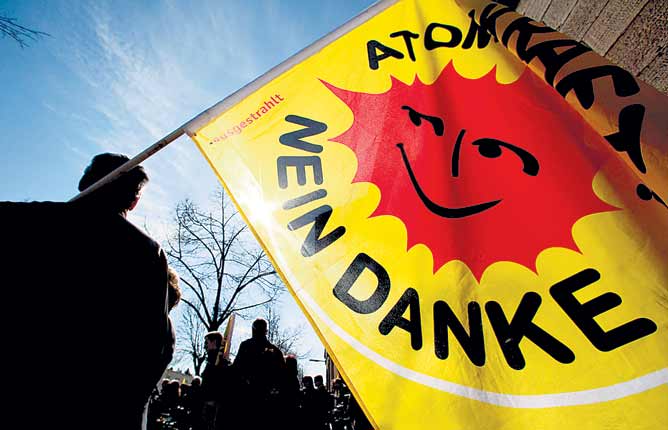Tony Paterson: Inside the capital of atomic angst
Notebook

The crackle of Geiger counter has not yet replaced the sedate hum of the Siemens vacuum cleaner in the average German household, but if retail figures are to be believed, it may be on the verge of doing so. German consumers have acquired an insatiable appetite for the devices.
The electrical goods giant Conrad reported last week that it had sold out of Geiger counters at shops throughout the country. "We cannot deliver a single one right now," complained a spokesman at company headquarters. Fukushima is to blame, even though the nuclear disaster unfolding there is taking place on the other side of the world, some nine thousand kilometres away.
Yet German atomic angst does not only manifest itself through impulse Geiger-counter buying. The same goes for iodine pills, which are supposed to limit the body's ability to absorb radioactivity. They have sold out to such an extent that local health authorities have felt obliged to issue warnings cautioning people against taking too many of them. "They only make sense if you live under a cloud of nuclear contamination," is how one official put it. Yet there are even reports about consumers avoiding Japanese restaurants.
There has been much speculation about the cause of Germany's exaggerated atomic anxiety. Several commentators have suggested that a traumatic history endured from 1914 onwards turned an already insecure nation into one with a propensity for extreme caution and the occasional outburst of paranoia. True or not, the Germans certainly have a heightened awareness of the nuclear threat and many regard this as wholly positive. A columnist in the respected Süddeutsche Zeitung newspaper wrote at the weekend that being against nuclear power had achieved a "religious" status.
The process started in the early 1980s with American attempts to station Cruise and Pershing II missiles in Germany, which coincided with the birth of the Green Party. The difference between nuclear weapons and nuclear power became blurred into a single anti-nuclear cause célèbre. For the past 30 years, Germany has been effectively waging a "religious war" over the nuclear issue. Chancellor Angela Merkel's extraordinary decision last week to order the immediate shutdown of seven of Germany's 17 nuclear power plants, in a knee-jerk response to the Fukushima incident, makes it pretty obvious that the anti-nukes are winning.
Is this what a green utopia really looks like?
Begun more than three decades ago, Germany's Green evolution has since penetrated deep into Teutonic shopping culture. Berlin is currently witnessing the triumph of the all-organic supermarket. The city boasts what is purported to be Europe's largest example in the painstakingly gentrified former Communist district of Prenzlauer Berg, but nowadays hardly any inner-city borough is considered complete without one. The stores provide everything from organic lavatory cleaner to "green" chocolate bars. A visit is a must, if only to gain a glimpse of what a green utopia looks like. For a notoriously rude city like Berlin, the atmosphere is friendly, almost collegial. Customers who make a monthly payment become "members" and get a discount. However non-German-looking faces are scarce. Organic consumers, it seems, are exclusively white, middle-class and indigenous. The only foreigners are the ones selling down- and-out street magazines on the pavement outside.
Farewell to Knut, a very special bear indeed
Hardly any creature can have been more unwittingly exploited by the Green cause than Berlin's legendary polar bear, Knut. Now suddenly, mysteriously and sadly, he is dead. At around three o'clock on Saturday afternoon, the large crowd that habitually gathers outside his enclosure at Berlin Zoo witnessed the four-year-old bear stand up and turn around in circles. Two minutes later he suddenly suffered a spasm, lost his balance and fell into his pool. In the water he had a series of spasms and finally sank. "It was if he had an epileptic fit," said a witness. Zoo staff who arrived minutes later pronounced him dead.
Born in December 2006 to a mother who rejected him, Knut was raised by his keeper Thomas Dörflein, who sang him to sleep with Elvis songs played on a guitar. Knut rapidly became the world's most famous polar bear. Millions flocked to visit him. He was used as a symbol and mascot by those attempting to curb global warming and even appeared on the front cover of Vanity Fair magazine's "Green Issue" with Leonardo DiCaprio. During his lifetime, Knut starred in films and earned Berlin Zoo well more than five million euros in visitor fees alone. However, zoologists and bear experts predicted that because he had spent his whole life in captivity, he would probably never manage to mate and produce offspring. A tragedy occurred two years after his birth, when Mr Dörflein suddenly died of a heart attack.
Some suggested that as he was brought up in the company of humans, Knut may even have thought of himself as human. Certainly anyone visiting the bear could not but be taken by the extraordinary manner it which he played up to his zoo audiences with what seemed like the professionalism of a trained actor. Knut's hundreds of unscripted performances must in the end have been too much for him. A post-mortem examination is planned. RIP Knut.
Join our commenting forum
Join thought-provoking conversations, follow other Independent readers and see their replies
Comments
Bookmark popover
Removed from bookmarks